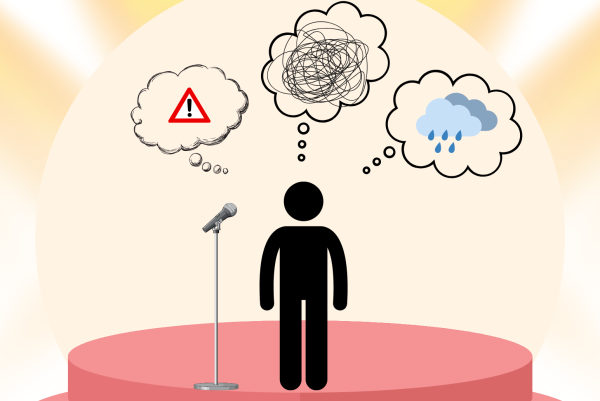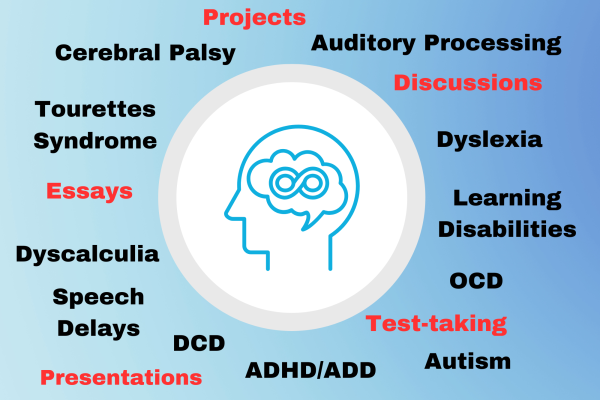Column: What even is a ‘race card’?
Photo credit: Leslie Castaneda
An artistic illustration by senior Leslie Castaneda. The illustration depicts a person of color holding a literal card surrounded by many question marks, symbolizing how senior Celeste Ramirez grapples with the concept of a “race card” in this column.
A few weeks ago, a friend and I were talking about our futures and what successful people of color look like. Over the course of the conversation, we began to discuss whether we believed their race played a factor in their success. An example that came up was Rihanna’s Fenty Beauty brand. Her brand aims to be inclusive of people of all skin tones and has been arguably successful for that reason. I started asking if Rihanna and other people of color can gain money or success by…Here I paused. I wasn’t quite sure what the word was. And then I said “playing their race card.”
I was taken aback by my word choice because I had never really thought about the term, let alone used it before. I had only really heard it being used in regards to politics. In her latest political column, Kimberely Strassel called the “race card” and any “identity-politics cards” ineffective campaign tactics. This summer, during the House Speaker Nancy Pelosi and Rep. Alexandria Ocasio-Cortezs’ “feud,” Rep. William Lacy Clay accused Ocasio-Cortez of “playing the race card.”
However, days passed after the conversation with my friend and I was still questioning my use of the term. What exactly is the race card and what is it used for? Who came up with the term, and is it a good or bad thing?
To me, the “race card” is looking at situation from the perspective of someone of my specific racial or ethnic group. For example, I tend to bring up race in my history classes. Due to my life experiences and the fact that I am usually in a predominantly white environment, I feel the need to make the racial and ethnic part of my identity seen and heard. However, me saying, “I use the race card in the classroom,” would most likely send the wrong message.
I feel that to some people, that statement would somehow translate as me using my racial identity to my advantage. Someone may believe I am “playing” this card in order to “win,” to shut down the conversation, or to get sympathy.
However, as columnist Dahleen Glanton said, “all of us, in fact, are awarded a racial card at birth. The only difference is that one is considered more valuable than the other.” We all have a race card, they just have different connotations for different people of color. For example, white people have a race card, but they don’t have to think about “playing it.” Their race card is their privilege.
It is impossible to “play a race card.” Especially in America, my race is not a card I can hold in my hand and “play.” It is a defining part of my identity. It is not a campaign tactic or an accusation that can be thrown around; it is a part of who I am, who all of us are. Whether we like it or not, our race is a defining factor in our lives.
For me, feeling the need to come up with a phrase like a “race card,” just proves how unprepared many people are for real conversations about race. Belittling someone’s race, a huge part of their identity, into an imaginary card is an attempt at dismissing what a person of color is saying. I say person of color specifically because more often than not, the “you are playing the race card” argument is used against them; the accuser is someone with more privilege. A lot of the time, the term is used to avoid taking responsibility for something that is actually discriminatory. It’s a microaggression.
Some people would still argue however, that the “race card” can be used to someone’s advantage. For example, affirmative action is a controversial topic that is commonly brought up.
I have thought about this myself. There have been moments of great insecurity in my life because I wondered, “Was I given this opportunity because of my race and ethnicity? Did they take pity on me, or do they need the ‘token’ person of color?” When I was applying to college or even sometimes when I write this column, I feel guilty talking about my struggles as a student of color because I think I’m exploiting them.
In the classroom, I’m always scared of being labeled as the “extra” person of color in the room, of coming off as hateful or angry. I sometimes find myself hesitating or pulling back in certain situations because I question if I’m being “hypersensitive” or doing more harm by drawing attention to race or ethnicity. I fear my race and ethnicity is the only part of me people see. I fear being thought of as the people of color “spokesperson.”
However, I have learned that at the end of the day, what I am writing on college applications and in this column is what I’m going through. What I am hesitating from saying in the classroom is what I’m feeling. These insecurities were formed by the fear of things like the “race card” and being scared of judgment for sharing my point of view.
The “race card” exists, just not in the way some people think it does. Someone’s “race card” is a part of who they are, not a “play” in a game. I have learned that people may accuse me of “playing the race card,” but all I can say is that I’m sharing me; my thoughts, my feelings and my opinions. If that offends you, that’s not my problem.

Celeste Ramirez joined the Oracle as a columnist in 2017 and is now the Multimedia Editor. Her column focuses on diversity at Archer, highlighting the...














Stephanie Ferri • Feb 10, 2020 at 7:42 pm
I really appreciate your point of view and explanation of this term. I learned a lot and feel like I have a better sense of the meaning behind this saying. I appreciate your info and insight!
Gracie Wilson • Feb 10, 2020 at 7:20 pm
As always Celeste, well said. I admire how you tie both personal experiences and observations into your writing.